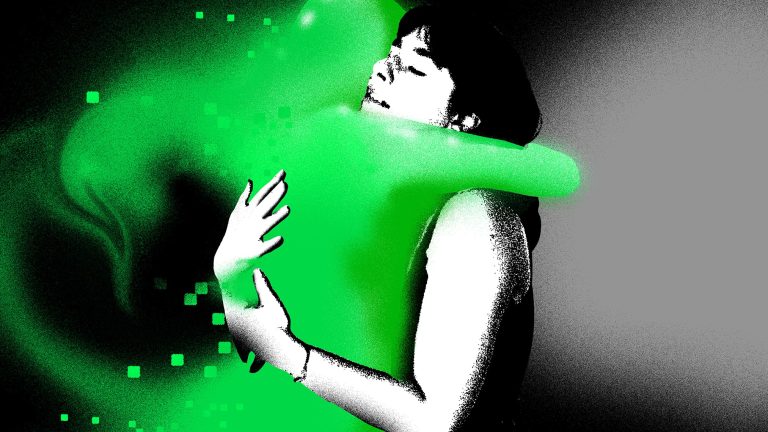Mitchell Sherman moved from Minnesota to teach English in China. A kindergarten teacher in the northeastern city of Liaoning, he started posting selfies to lifestyle app Xiaohongshu in February. That’s when Sherman, who is Black, started experiencing online racist attacks.
Sherman started receiving insulting comments and direct messages from a number of accounts on the platform. These accounts had profile pictures depicting the Confederate flag, unidentified white police officers from the U.S., and even Derek Chauvin, the former officer convicted of killing George Floyd. One comment said, “Please go back to America as a slave, Black man.”
“This is embarrassing,” Sherman told Rest of World. “China is a nice country. The only problem I have with China is that I realized that Chinese people are so obsessed with skin color.”
Rest of World reviewed Xiaohongshu, Kuaishou, and Douyin — TikTok’s sister app in China — and found hundreds of users with profile pictures of uniformed American cops or American-sounding usernames such as “Sheriff Roberson,” “Captain America,” and “Florida Jack, No. 5314.” Others have changed their names to “Abraham Lincoln”, noting in parentheses that they “regret liberating Black slaves.” These accounts post racist remarks, harassing Black influencers and users with slang such as “emptying the magazine,” referring to how some U.S. police officers have fired multiple rounds at suspects.
While the Chinese government and social media companies have denounced racism, it remains pervasive online. News about Black people in China regularly triggers xenophobic comments directed at what some fear to be an influx of Black immigrants. Chinese women who date Black people or have mixed-race children have also drawn sexist attacks online. It’s unclear what has driven the recent spike in racist speech.
A university student in Guangdong province, who spoke on condition of anonymity to protect his privacy, told Rest of World he had participated in the trolling by changing his Douyin name to “Louisiana Officer Hamoleite.” He said he got the idea for the name, which sounded like “Hamlet,” from a Chinese cartoon he had watched as a child. “I don’t deny I am a racist, “ the student told Rest of World.
Kawawa Kadichi, a Zambian actor in China nicknamed “Shaanxi Black boy,” challenged the trolls in a May 13 video. “Brothers, I noticed that recent videos related to Black people are all filled with comments featuring some police officers,” he said. “Now mention all the police officers and bring them to me!” The video triggered thousands of hateful comments.
According to Fang Kecheng, a communications professor at the Chinese University of Hong Kong, Chinese state media has used coverage of police brutality in the U.S. as evidence of the latter country’s failures in human rights, without discussing its historical roots or relevance to its audience in China. “Ordinary people regard [police brutality] as a spectacle from across the Pacific,” Fang told Rest of World, “without realizing that when they are using the meme, they are no different from the racists in America.”
Fang said the online harassment of Black people also showed that despite having strict censorship on a wide range of political issues, Chinese social platforms have exercised limited control over racist hate speech.
Researchers have said that the Chinese government tends to rein in online racism only when it might affect China-Africa relations. Last year, domestic social media apps banned Chinese creators in Africa from livestreaming after a viral BBC investigation accused a Chinese video-maker in Malawi of physically abusing at least one child. But the ban has since been lifted.
Kuaishou and Xiaohongshu did not respond to requests for comment. ByteDance, Douyin’s parent company, declined to comment on this article.
Some social platforms appear to be clamping down on the trolling. On Douyin, some users joked that they “died on the job” or were put on “administrative leave” after Douyin removed their white-cop profile pictures. One university student from Zhejiang told Rest of World that Douyin blocked him from using the name “Florida Sheriff Jack No. 7654” after he posted racist comments.
Douyin and microblogging site Weibo have also blocked a trending hashtag — “Do not worship foreigners” — which was widely used to protest against Black immigrants. Screenshots on Douyin showed that more than 900,000 users participated in the “Do not worship foreigners” challenge before it was taken down.
Kadichi, who has been posting comedy videos on Douyin since 2017, told Rest of World he had closed his direct messages and comments-sections following the latest attacks. “It makes me feel sad,” he said. “They think this is cool. They think this is what’s trending. And then, they think they’re just going to join this trend without even thinking about the effects they’re going to bring to other people.”



